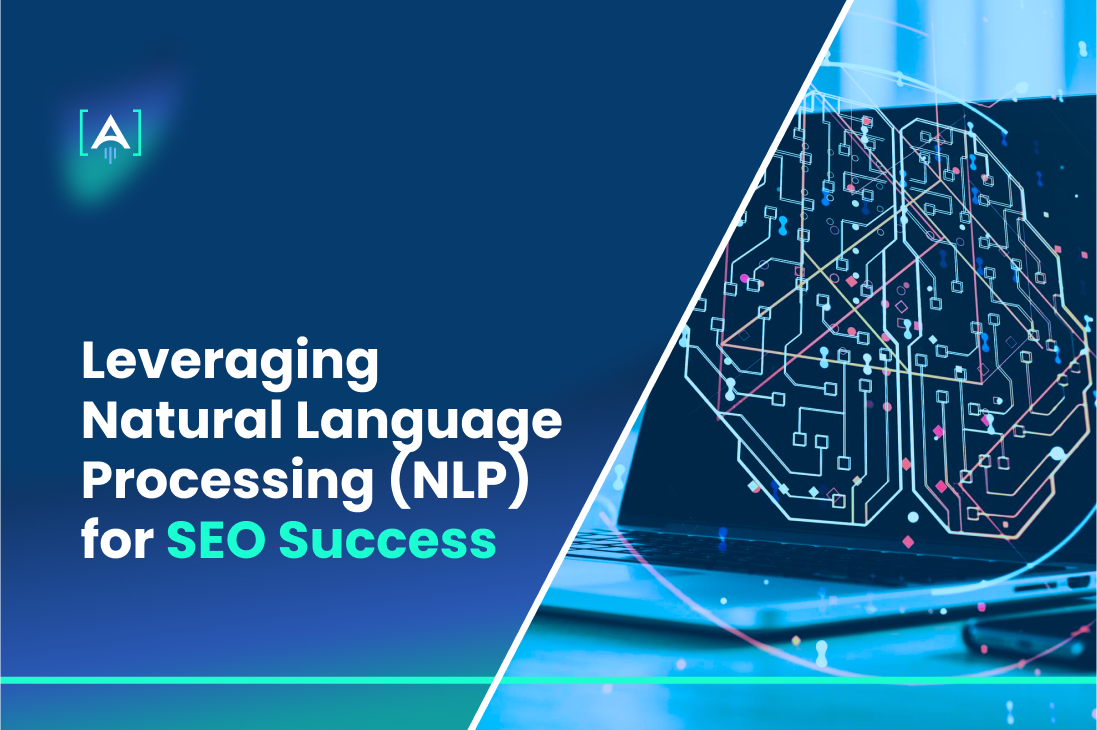In the ever-evolving digital marketing landscape, integrating Natural Language Processing (NLP) with Search Engine Optimization (SEO) is not just innovative—it’s essential.
NLP SEO leverages sophisticated algorithms to understand and interpret human language in a way that fundamentally transforms SEO strategies.
According to Statista, the Natural Language Processing market is projected to reach US$36.42bn in 2024.
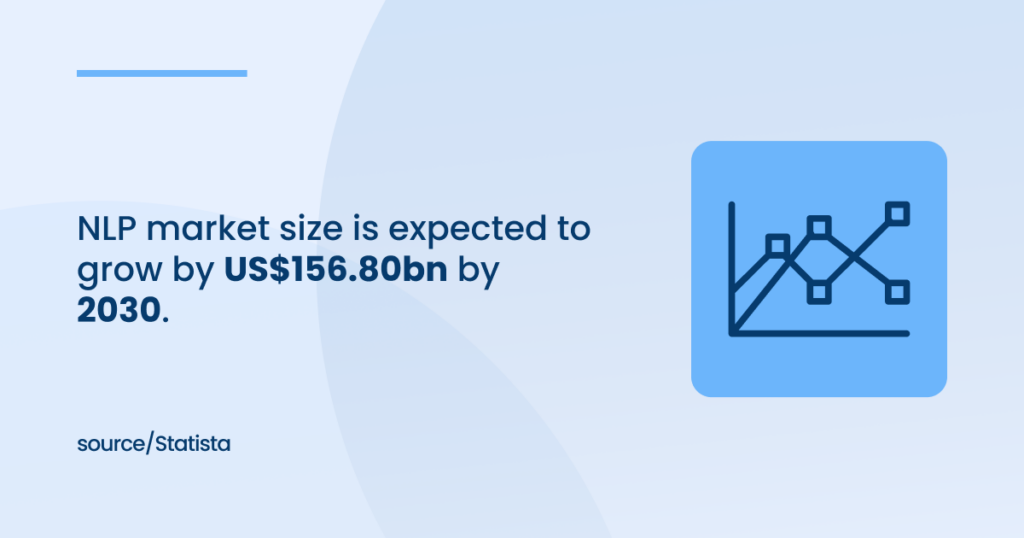
This fusion allows an SEO Agency to go beyond keywords, tapping into user intent, sentiment, and contextual meaning, thereby refining search relevance and enhancing content visibility.
The blog post will introduce you to how to leverage the Natural Language Processing SEO strategy for success.
What is Natural Language Processing?
Natural Language Processing (NLP) is a branch of artificial intelligence that enables machines to understand, interpret, and respond to human language in a way that is both meaningful and useful.
Source: Usage of Natural Language, Statista
NLP SEO uses complex algorithms and varied language models to improve how computers understand human language, making it essential for many technologies like voice-operated devices, chatbots, analytics, and automatic translations.
The Role of SEO in Digital Marketing
Search Engine Optimization (SEO) remains a cornerstone of digital marketing, a meticulous process designed to increase the visibility of websites and content in search engine results.
Effective SEO strategies ensure that a business’s content is more accessible to potential customers, driving organic traffic and enhancing engagement and conversions.
Whether it’s e-commerce SEO, fintech SEO, HVAC SEO, SaaS SEO, or law firm SEO, the fundamental goal remains the same: to rank well in search engine results for targeted keywords and phrases that are crucial to the business’s audience.
How NLP and SEO Intersect
The intersection of NLP and SEO marks a revolutionary shift in developing and implementing SEO strategies.
By understanding the nuances of human language, NLP SEO allows professionals to craft strategies that are not only keyword-focused but also aligned with the natural language patterns of their target audience.
- Understanding User Intent: NLP SEO techniques analyze search queries to discern their intent, whether informational, navigational, or transactional. This allows for more targeted content that meets users’ specific needs.
- Improving Content Relevance: By understanding the context and semantics of search terms, NLP helps create more relevant content to user queries. This relevance is increasingly crucial as search engines like Google continue to refine their algorithms to favor user-focused content.
- Optimizing for Voice Search: As voice search becomes more prevalent, NLP is essential in optimizing content for the conversational tone and structure of voice search queries. This includes understanding the casual phrasing and long-tail keywords that are typical in spoken language.
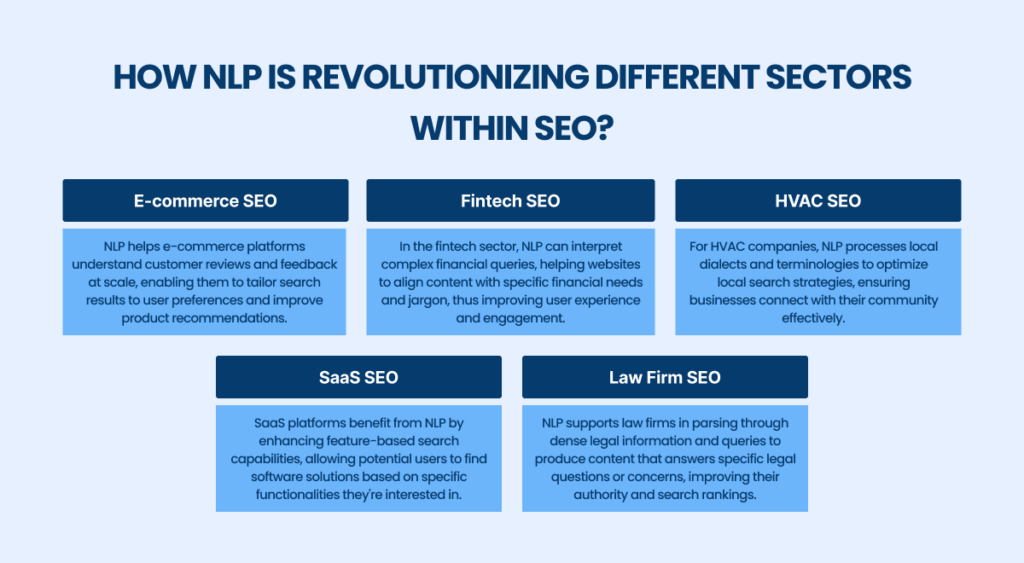
Incorporating NLP into SEO: Key Techniques
- Semantic Search: NLP improves semantic search capabilities, which interpret words’ meanings rather than using keywords alone. This aligns content with user intent and context, enhancing content discoverability.
- Sentiment Analysis: This NLP technique gauges public sentiment from text data. SEO strategies can leverage this to adjust content based on the emotional tone of user feedback and reviews.
By integrating NLP SEO techniques into strategies, businesses can dramatically enhance the effectiveness of their digital marketing efforts.
They can cater more precisely to their target audiences’ needs and position themselves advantageously in a highly competitive market.
As we advance in both fields, the synergy between NLP and SEO will undoubtedly become a critical pivot for future digital marketing successes.
Key NLP Techniques that Enhance SEO
Natural Language Processing SEO has become a transformative force in SEO, leveraging its capacity to understand and interpret human language in a way that aligns with user behaviors and expectations.
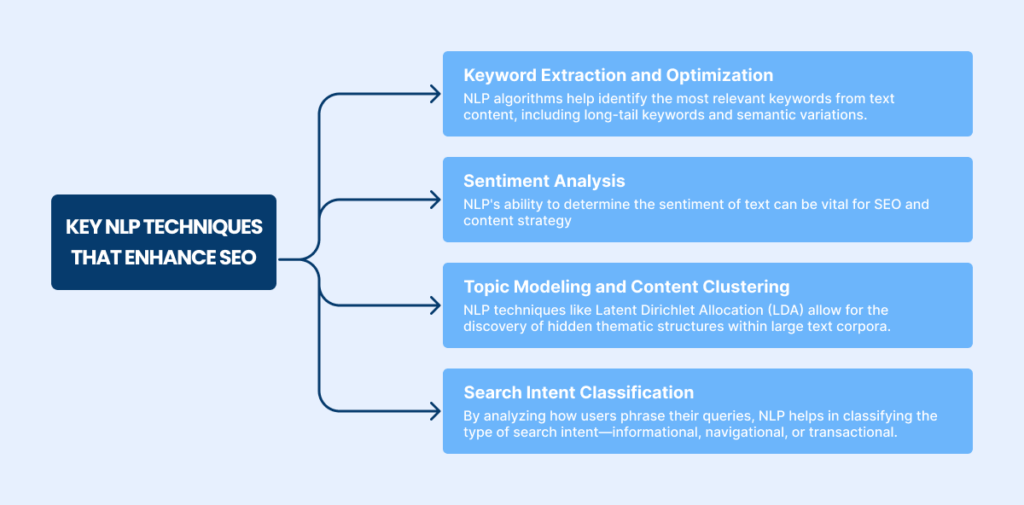
Various NLP SEO techniques have been employed to refine SEO strategies, from improving keyword research to enhancing content relevance and user engagement.
These techniques aid in optimizing traditional search engines and are pivotal in adapting to the nuances of voice and mobile search, making them indispensable in modern SEO practices.
Sentiment Analysis
Among the most impactful NLP techniques in SEO is sentiment analysis. This process involves analyzing texts to determine the emotional tone behind a sequence of words.
In the context of SEO, sentiment analysis can be applied to various types of content and user interactions, such as customer reviews, forum discussions, and social media posts, providing insights that can significantly enhance marketing strategies.
Understanding User Sentiments in Search Queries
Understanding user sentiments in search queries is a critical application of sentiment analysis that can vastly improve SEO strategies.
This technique goes beyond keyword matching to decipher the emotional context of search queries, which can influence the type and format of content that should be presented in search results.
Enhancing Keyword Research and Content Relevance
Traditional keyword research typically focuses on the frequency and popularity of specific terms or phrases.
However, integrating sentiment analysis allows SEO specialists to expand their approach by considering the emotional undertones of the keywords used.
This approach can uncover deeper insights into what users are truly seeking:
- Identifying Emotional Triggers: By analyzing the sentiment of user queries, companies can identify emotional triggers that influence search behaviors. This information can be used to tailor content that directly addresses these emotions, improving engagement and conversion rates.
- Refining Content Tone and Messaging: Sentiment analysis helps adjust the tone and style of content to better resonate with the target audience, enhancing its effectiveness and user experience.
Optimizing for User Intent and Search Context
Sentiment analysis plays a pivotal role in understanding not just what users are searching for but why they are searching for it, often referred to as ‘search intent.’ This insight is crucial for creating content that meets users’ needs more effectively:
- Improving Content Match: By understanding the emotional context of searches, SEO professionals can create content that matches the user’s intent more closely, whether looking for quick answers, detailed explorations, or emotional support.
- Adjusting SEO Strategies According to Sentiment Trends: Analyzing sentiment trends over time can help businesses anticipate changes in consumer behavior and adjust their SEO strategies accordingly.
Driving SEO Strategy with Advanced NLP Techniques
Incorporating sentiment analysis into an SEO strategy involves a range of advanced natural language processing SEO techniques that collectively enhance the understanding and application of user data:
- Semantic Analysis involves understanding the meanings of words in context. It complements sentiment analysis by clarifying ambiguous terms in user queries, leading to more accurate content alignment.
- Natural Language Processing SEO Techniques: Techniques such as tokenization, stemming, and lemmatization process and analyze user queries, facilitating a deeper understanding of search patterns and behaviors.
Case Studies and Practical Applications
Many businesses have successfully integrated sentiment analysis into their SEO strategies, seeing significant improvements in user engagement and content effectiveness.
For example, an e-commerce site might use sentiment analysis to detect positive and negative sentiments in customer reviews, adjusting product offerings and descriptions to meet customer expectations better.
Similarly, a service provider could analyze customer feedback to identify common pain points, enhancing service offerings and communication strategies.
Challenges and Considerations
While sentiment analysis offers considerable benefits, it also comes with challenges.
The accuracy of sentiment analysis can vary based on the complexity of language and cultural nuances. Moreover, interpreting the emotions from text requires sophisticated algorithms and continuous refinement to adapt to new expressions and slang.
Entity Recognition
Entity Recognition is a fundamental component of Natural Language Processing (NLP) that significantly boosts SEO efforts by identifying and categorizing key elements from text, such as brands, people, locations, and products.
Source: Natural Language Processing by Fields, Statista
This capability is crucial for refining SEO strategies, particularly in complex fields like B2B SEO, where distinguishing between product types, company names, and industry-specific jargon is essential for targeting the right audience and improving content relevancy.
Identifying Brands and Products in Text
The process of identifying brands and products in text involves extracting these specific entities from vast amounts of data, which can then be utilized to optimize search engine visibility and relevance.
For instance, an NLP system can scan blog posts, reviews, or product descriptions to highlight relevant products and brands, ensuring that they are prominently featured in search results.
- Enhanced Keyword Optimization: By recognizing brand and product names within the text, SEO professionals can optimize these entities for search algorithms, making it easier for potential customers to find specific products or brands.
- Improving Content Targeting: Entity recognition allows for more tailored content strategies. If an SEO tool identifies that certain brands or products are frequently mentioned in conjunction with positive sentiments, content can be created to more effectively target these positive associations.
Topic Modeling
Topic modeling is another NLP technique that enhances SEO by discovering the underlying themes or topics within large volumes of text.
This approach not only helps in organizing content thematically but also aids in identifying what subjects are most relevant to target audiences, including uncovering emerging trends or interests that can be capitalized on in content strategies.
Discovering Themes in User Queries
By analyzing user queries, topic modeling can reveal common themes and topics that interest a specific audience. These themes and topics can then be used to guide content creation and optimization.
For example, in B2B SEO, understanding the recurrent themes in user queries can help tailor content to answer common questions, address prevalent challenges, or highlight specific solutions that are in demand.
- Content Gap Analysis: Topic modeling can identify underrepresented topics in existing content, providing SEO strategists with opportunities to create new content that fills these gaps.
- Audience Segmentation: Different themes from user queries can indicate varied interests among different audience segments, allowing for more targeted content and marketing strategies.
Semantic Search
Semantic search represents a paradigm shift in how search engines interpret user queries.
Moving beyond the limitations of traditional keyword-based searches, semantic search engines utilize NLP to understand the context and intent behind a search query.
Source: Semrush
This approach allows for a more nuanced query interpretation, leading to more accurate and relevant search results.
Beyond Keywords to Search Intent
The transition from keywords to search intent is central to semantic search. By understanding the intent behind a user’s query, search engines can deliver results that more accurately meet the user’s needs.
Source: Semrush
This is particularly important in environments susceptible to negative SEO practices, where the context and intent can mitigate the impact of irrelevant or malicious content.
- Contextual Understanding: Semantic search engines analyze the context in which terms are used, helping to distinguish between different meanings of the same word based on additional words in the query.
- Long-Tail Keyword Optimization: As semantic search understands natural language more effectively, it places greater importance on long-tail keywords, which are often closer to natural speech patterns. This is particularly beneficial for voice search optimization.
Practical Applications of NLP in SEO
The integration of Natural Language Processing SEO has opened up many possibilities to enhance online content’s visibility and effectiveness.
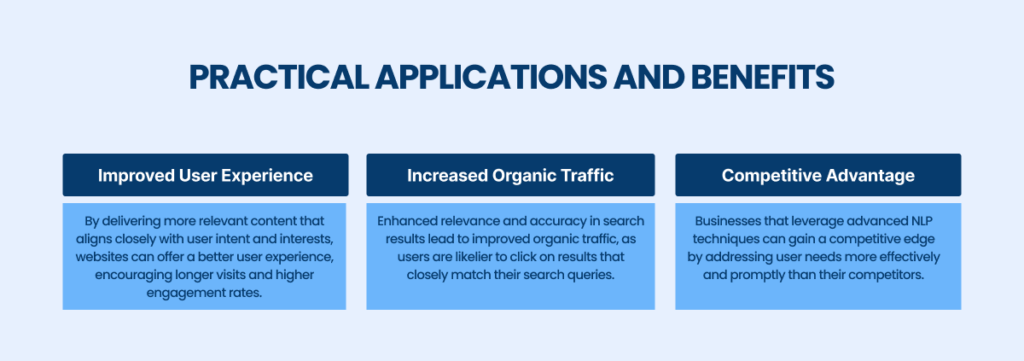
By leveraging the capabilities of NLP, SEO practitioners can significantly improve the content creation process, refine keyword research, and optimize for the rapidly growing trend of voice search. Here’s a detailed look at how these NLP applications transform the SEO landscape.
Content Optimization
One of the core benefits of using NLP in SEO is the ability to generate relevant, highly engaging content that is tailored to the target audience’s specific needs.
Source: Omnius
NLP techniques enable analyzing and understanding large datasets to identify what works best for specific user groups. This involves examining user behavior, preferences, and engagement levels across different content types and themes.
- Enhanced Content Personalization: NLP algorithms can analyze past interactions and engagement to suggest content adjustments more likely to resonate with the audience. This could include varying the content’s tone, style, or complexity based on the preferences identified among different user segments.
- Contextual Relevance in Content: By understanding the context in which certain terms or topics are discussed, NLP helps create content that is deeply aligned with user interests and search contexts. This improves user satisfaction and boosts the content’s chances of ranking higher in search engines.
Keyword Research and Expansion
Source: My Codeless Website
Finding Long-Tail Keywords with NLP Tools
Traditional keyword research often relies on looking up the frequency of terms and their variants in a database.
NLP revolutionizes this by allowing for a more nuanced approach that includes discovering long-tail keywords that are less competitive but highly relevant. These keywords often represent more specific queries and can drive targeted traffic to a site.
- Semantic Similarity and Keyword Clustering: NLP tools can group keywords semantically rather than merely by common keywords. This method identifies themes and concepts related to core keywords, providing new opportunities for targeting.
- Predictive Keyword Analysis: By leveraging predictive analytics, NLP tools can forecast emerging trends and associated keywords. This proactive approach helps content creators stay ahead of industry trends and meet the audience’s needs before they become apparent through traditional analytics.
Voice Search Optimization
Tailoring Content for Voice Queries
As voice search continues to grow with the proliferation of smartphones and smart speakers, optimizing content for voice queries has become crucial. NLP plays a significant role in this arena by interpreting and processing natural, spoken language.
Voice searches often involve complete sentences or questions rather than the fragmented keywords typically used in text searches.
- Conversational Keyword Optimization: NLP helps identify conversational phrases that are likely to be used in voice search. By incorporating these phrases into content, SEO strategists can better align their offerings with how potential customers naturally speak.
- Intent Detection: Voice searches are typically intent-driven, with users expecting immediate and relevant answers. NLP can decipher the intent behind voice queries, enabling content creators to structure content that directly answers or addresses the user’s needs.
Practical Case Studies
Implementing NLP in SEO strategies has yielded positive results across various industries.
For example, an e-commerce company may use NLP to analyze customer reviews and Q&A data to understand common customer issues and queries, which can then inform both product development and content strategy.
Meanwhile, a service provider might utilize voice search optimization to capture local search traffic, answering common queries with content formatted specifically for quick, spoken answers.
Challenges and Considerations
While the potential of NLP in enhancing SEO is immense, there are challenges to consider:
- Complexity and Resource Requirements: Implementing NLP solutions requires a certain level of expertise in language processing and machine learning and substantial computational resources to handle large datasets.
- Keeping Up with Evolving Algorithms: Search engines continually update their algorithms, which can affect how well NLP-enhanced content performs. Continuous monitoring and tweaking are necessary to maintain the effectiveness of an NLP-driven SEO strategy.
Partner with [A] Growth Agency for Your Business SEO Enhancement
NLP is like having a secret decoder ring for the language of search.
By understanding the deeper meaning behind queries and how users interact with information, you can craft content that ranks higher and keeps people glued to your site.
[A] Growth Agency knows the right strategy for your business. We specialize in turning entrepreneurial dreams into reality with effective, tailored growth strategies.
Our team considers growth as the driving force. Moreover, innovation and adaptability are the crucial pillars supporting our ambitions.
We strive to stay ahead of industry trends, ensuring that our strategies and solutions meet current demands and anticipate future needs.
If this satisfies your requirements, please proceed.
